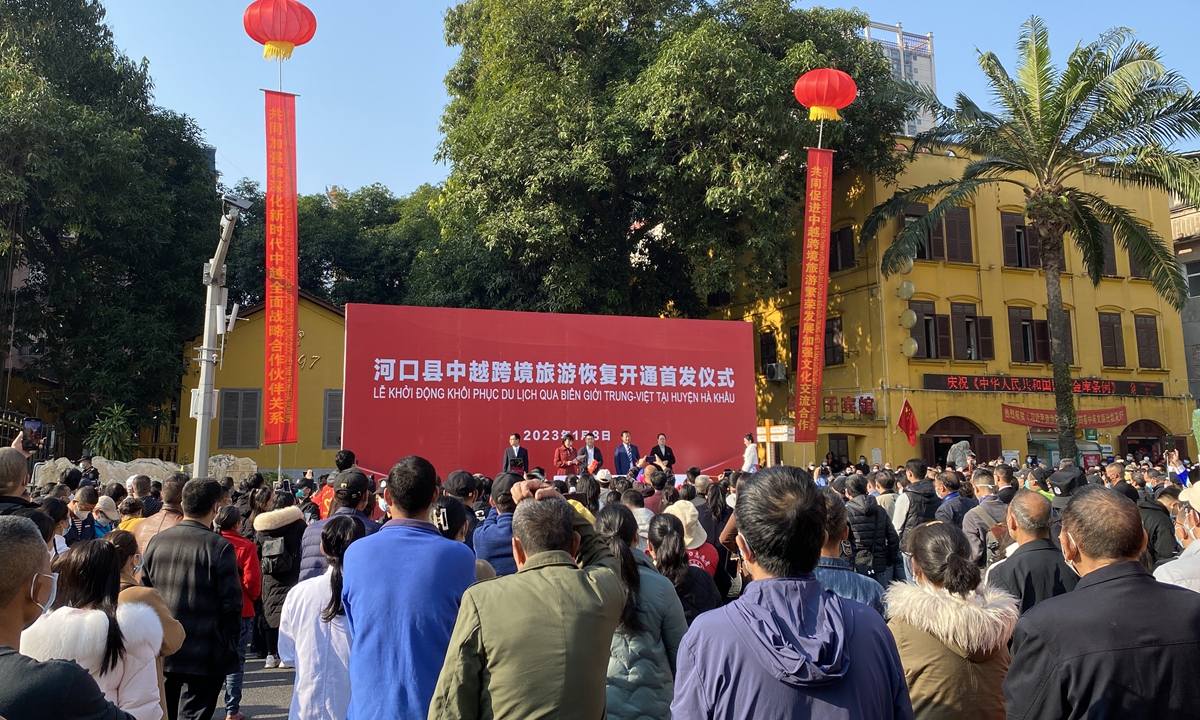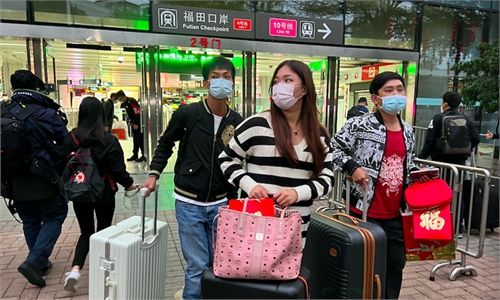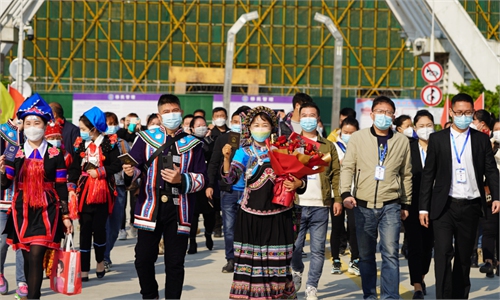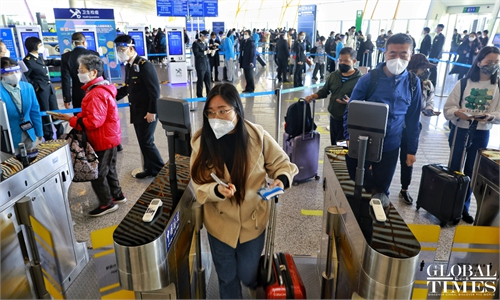GT on the spot: Passengers hail border reopening between China, Vietnam: ‘I am waiting for the moment for three years’

Crowds are seen at a ceremony in front of the Nanxihe highway port marking the reopening of China-Vietnam cross-border travel in Hekou, Southwest China's Yunnan Province on January 8, 2023, the first day of China's downgraded COVID-19 management. Photo: Li Qiaoyi/GT
Cross-border travel between China and Vietnam resumed Sunday at Hekou, a major land port in Southwest China's Yunnan Province, with flocks of tourists grabbing their first chance to taste Viet food and culture on the first day of China's downgraded COVID-19 management.Local officials are upbeat about a full recovery in cross-border travel this year as the border reopening is set to accelerate cross-border travels.
Buoyed by the prospect of returning to the hustle and bustle after a 3-year hiatus against the coronavirus, travel industry insiders also set big goals for travel numbers between China and Vietnam.
The tourism revival likely exemplifies a wider rebound in the local economy as the movement of people across borders - including laborers and businesspeople - became smoother in the wake of the border reopening.
At 8 am Sunday, the Nanxihe highway port, a part of the Hekou port that serves as a pedestrian border crossing, officially reopened.
The port recorded a daily tally of 124,000 crossings at peak levels before the pandemic, Yang Huijianxiong, director of the port office of the Hekou government, told reporters.
Over the past three years, the pedestrian checkpoint closed while the other checkpoint of the port that allows for cargo shipping remained open.
The pandemic's fallout on cargo transport was tangible. Last year, cargo shipping through the port was estimated at 2 million tons, well below its peak levels of 6 million tons, Yang said. He expected the 2023 volume to come back to 6 million tons.
Not long after the border opening, streams of people were seen entering China after crossing a highway bridge that connects Hekou with Vietnam's northern Lao Cai Province.
After a brief ceremony in front of the Nanxihe highway port at 10 am that marked the reopening of China-Vietnam cross-border travel, long lines of people were seen waiting to get through the checkpoint.
Zhou Qiling, hailing from the Hekou Yao Autonomous County where the port is located, was among the first group of travelers to relish the border opening.
As a frequent traveler to Vietnam, Zhou missed previous happy moments but had her travel plan halted for the past three years, she told the Global Times on Sunday.
Now she was thrilled to be able to visit Vietnam again, where Sapa, a mountainous resort in Lao Cai known for French-style buildings, is on her top-to-visit list.
This year will surely embrace a full recovery in cross-border travel, Yu Yang, Party secretary of Hekou, said on Sunday.
In a similar tone, Liang Bo, deputy chief of the culture and tourism bureau in Hekou, told the Global Times Sunday that local cross-border travel is on track to recover to pre-COVID levels.
Hekou plans to increase bilateral exchanges and cooperation between China and Vietnam, mull over the joint creation of a border travel pilot zone and a cross-border travel cooperation zone, and ramp up the availability of cross-border self-driving tours, among wide-ranging efforts to boost local appeal to tourists, according to Yu.
The autonomous county has over the years forged broad-based partnerships in cross-border travel with Lao Cai. In 2019, the number of people crossing the Hekou port amounted to 6.61 million, official data showed.
Recalling the good old days, Jiang Fuquan, managing director of travel agency China Comfort in Hekou, told the Global Times Sunday that the travel agency arranged tours for more than 200,000 passengers annually between 2018-19, plying across the Hekou port and Dongxing Port in South China's Guangxi Zhuang Autonomous Region that's connected to Mon Cai in Vietnam.
There weren't any such tours over the past three years. As a consequence, Jiang's travel agency logged annual losses of up to 8 million yuan ($1.17 million), she said.
The availability of discounted bank loans and temporary deferrals of social insurance premium payments, among other government bailout measures for virus-plagued businesses, was cited by Jiang as having offered the much-needed helping hand.
Now the worst is over. Jiang envisioned a gradual return to the past glory, as the travel agency, featuring comparatively higher-end vacation deals, expects a comeback to profitability this year before restoring to pre-virus levels in 2024.
The atmosphere of joy is being felt across the border. The travel agency's partners in Vietnam including scenic attractions and hotels are willing to offer enticing discounts, Jiang disclosed, and she received a flurry of calls from them immediately after the border opening announcement was made public.
Sharing similar zeal, a Vietnamese businesswoman using the Chinese name Huang Haiyan became the first inbound traveler entering China through the Hekou port after the reopening Sunday.
"I've been waiting for the moment for three years," she said. "It comes finally".



